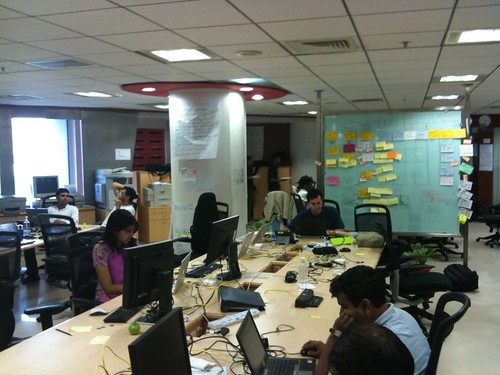Ran writes, “How much privacy a person has, is often an indication of what position they hold in a hierarchy. Who gets the corner office? Who gets a desk in the middle of an open area?” Yes, that is a cliché in corporate USA and Europe. However, Extreme Programming teams almost always sit together, and I think, in general, most great teams do too.
I think this is part of the shift from an industrial economy, to an economy of ideas. In an industrial economy, the emphasis is on repeatable, standardized processes. By definition, there is a small group of people setting the standards and designing the processes. The best standards win – think of Henry Ford’s production line, Taylorism, and school.
For some time our economy and society has been shifting to an economy based on ideas. Here, firms, teams, and people win by having better ideas, not standard ideas. New and creative ideas are valued. And the best way to develop creative ideas is with other people, not by sitting in a room by yourself. Even some CEOs recognize this – Intel’s former CEO Andy Grove used a cubicle partly because his co-workers could overhear his conversations and give him help.
There is a movement afoot. I often say I wish my work was like my son Martin’s school, PSCS – it feels vibrant, warm, and fun, and often when I go there I don’t want to leave. So one of the first things I did when I started working at Grameen Foundation was create a team room, and got my team members sitting together. Our productivity jumped because we could get help from each other quickly – and at least for me, the warmth of the place went up a lot.
In the programming world, there is controversy about this. Microsoft rarely uses team rooms, putting most programmers into private offices where they can’t collaborate in-person with each other. So does Joel Spolsky. And Don DeMarco recommends it in the great book Peopleware – the same book where he recounts the story of the legendary Black Team.
But there have been great teams that do it the other way, like Chrysler’s famous C3 team ¹ that spawned Extreme Programming (XP). ThoughtWorks does it this way, as does my friends Paul Ingalls’ and Troy Frever’s XP team at Smilebox. When I visit ThoughtWorks or Smilebox, I don’t want to leave.
Anarchists often say that big business is the same as fascism and oppression, and make up that there is nothing to learn from corporations and business. That is true for many or even most large corporations. Business are changing the world – many for worse, but more and more there are ones that change it for the better – and the way they do it is by implementing their ideas. In the world we live in, if you want to change the world, shipping is what counts.
And it’s easier to ship if you’re sitting in the same room with your team.
Note 1: The Chrysler C3 team actually did not fully complete their software for Chrysler, and the project was eventually was shut down. However, in addition to shipping software, they also shipped the Extreme Programming methodology, which had significant influence on the software industry. Mistakes and failures are not always what they seem to be. I’ll say more about that in a future post.

